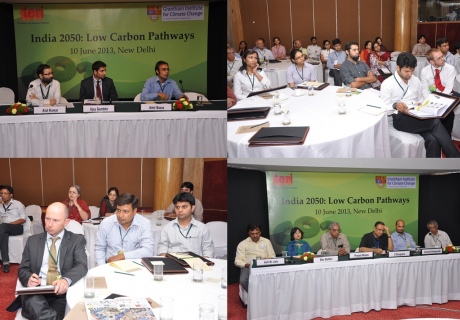India's pathway to a low carbon future

Representatives from a wide range of organisations gathered in New Delhi in June to discuss how to achieve a low-carbon development pathway in India.
At the workshop, co-hosted by the Grantham Institute for Climate Change and The Energy and Resources Institute (TERI), India, attendees looked at the opportunities and challenges facing India in transitioning to a low-carbon energy system in the period to 2050.
The successful workshop was part of the UK Government funded AVOID research programme. It built on earlier India emissions pathways work led by Grantham under the AVOID programme.
The key message from the workshop was that climate change could have significant impacts in India and globally but that there are pathways for reducing greenhouse gas emissions that could help to avoid a large portion of these impacts.
The Grantham Institute has already worked closely with the UK government’s Department of Energy and Climate Change to discuss the benefits of long-term energy planning to 2050 with Chinese government officials and researchers, who have now developed their own China 2050 Pathways calculator. This approach to energy and emissions analysis is now being adopted in a range of countries, including India.

Attendees at the workshop in New Delhi
Three different analytical studies on India’s future CO2 emissions levels were presented at the workshop and a number of technologies and measures emerged as being critical to reducing future emissions growth.
These include aggressive improvements in energy efficiency across all sectors, combined with a low-carbon electricity sector (with a dominant role for renewables including wind, solar and biomass) and further low-carbon options (such as electrification and switching away from coal and towards gas and biomass).
A panel discussion in the afternoon, which included representatives from TERI, the Planning Commission, Tata, Schneider Electric and the National Institute of Advanced Studies, allowed attendees to discuss India’s opportunities and challenges in developing and deploying low-carbon technologies and measures.
One of the major challenges will be in designing policies to drive forward low-carbon energy technologies when there is still significant poverty and a lack of energy access in the country. Another challenge will be planning around the effective use of increasingly scarce land and water resources.
It is intended that key discussion points from the workshop will be used to formulate future research programmes in order to further advance knowledge on how to achieve a low-carbon development pathway in India.
additional resources
Background information on the pathways studies in India and Britain is available to download, together with a copy of the minutes from the workshop.
All presentations from the workshop are available to view below:
- Avoiding dangerous climate change - Dan Bernie
- 2050 pathways - Jan Kiso
- India's Low Carbon Society 2050 - Amir Bazaz
- India’s CO2 emissions to 2050 - Ajay Gambhir
- India’s Low Carbon Development Pathways to 2020 - Atul Kumar
If you are interested in learning more about the AVOID programme, a symposium flyer that describes some of the research highlights is available to download.
Article text (excluding photos or graphics) © Imperial College London.
Photos and graphics subject to third party copyright used with permission or © Imperial College London.
Reporter
Dr Ajay Gambhir
The Grantham Institute for Climate Change